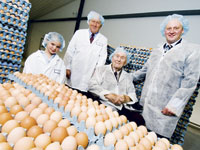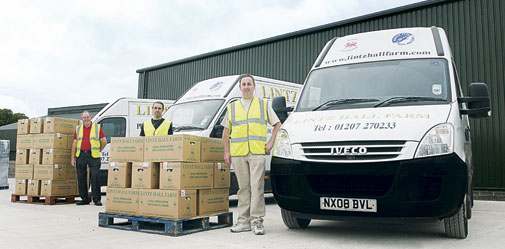Northern firms take up egg marketing challenge

With the egg market suffering from the effects of a surplus, Jeremy Hunt talks to two companies who are stepping up their own marketing efforts
Social networking sites Facebook and Twitter are about to have a major role to play in the way Harrogate egg producer Chippindale Foods sets about an innovative re-branding initiative.
The Chippindales began producing eggs in the 1930s, but it was during the 1970s and 1980s that the company’s steady expansion established the foundation of today’s successful family-run business.
Its organic Bronte Brown and its Free Ranger eggs, in their distinctive boxes, are already top sellers in Morrisons and Booths supermarkets in the north of England. But there’s no room for complacency.
“We’re about to re-brand our eggs and that’s a very important undertaking for us,” says managing director Nick Chippindale. “But this time we’re looking far beyond the usual approach of simply tackling visual imagery and conventional methods of promotion and marketing.
“Our aim is to consolidate the company’s core values using the most modern means of communication – and for vast numbers of people that means Facebook and Twitter.”
Precisely how the company is going to take egg marketing into the cyber-world is still under wraps. But it’s something that Mr Chippindale is convinced is the most effective way of creating and maintaining a new style of dialogue with consumers.
“We believe that if we want to stay in touch with our customers this is the best way we can do it. We want our products to speak for themselves through this very immediate and fast medium of communication.”
But Mr Chippindale isn’t about to start issuing egg recipes and nutritional information via these internet opportunities. “It’s got to be far more subtle than that.
“It’ll be aimed at confirming our values as a company and the standards we achieve. There will certainly be a thirst for information among consumers in the run-up to the cage-ban.
“We’ve got to get more savvy – and I think that’s the challenge for any marketing re-vamp,” says Mr Chippindale, who recently won a Nuffield Scholarship and used it to travel to the USA, Europe and China to study new approaches to marketing.
“We’re all now in a global community – and that means egg producers and packers too. Consumers are more sophisticated and certainly keen to know more about how their food is produced. But we want to take this to a new level and move on from simply promoting the corporate image.
“We’ll be developing new brands under the Chipppindale umbrella, but our ultimate aim is to establish a more effective way of engaging with our customers and to build new lines of communication that we believe will be of benefit to them and to us as a business.”
The Tulip family from Gateshead, Co Durham, are now the region’s largest egg producers and will soon have 80,000 free-range birds and four colony units of 35,000 birds each.
George Tulip, who runs the business with sons Richard and Stephen based at Lintz Hall Farm, Burnopfield, says the family have always been “keen marketers”, but acknowledges that there are new marketing challenges ahead as colony systems replace cages.

“We’ve always been keen on point of sale material including leaflets and posters to promote our eggs, but as consumers start to see eggs on the supermarket shelves produced from colony systems rather than caged bird we – and that means the industry as a whole – must take up the marketing and promotion initiative we’re all presented with.
“Free-range eggs tick all the consumer boxes, but there will always be a strong market for economy eggs. We must now strengthen consumer confidence in eggs from the colony system even though we won’t be allowed to remove the word “caged” from the boxes,” says George Tulip.
Lintz Farm Eggs will carry additional information on its boxes to compensate for this restriction.
“It’s vital that we tell consumers about the welfare advantages of eggs produced from colony systems.
“This is a challenging time for the egg industry so we must grasp the marketing opportunity presented by the colony system and the fact that the eggs are still high quality, but retailed at a lower price than free range – and the price-conscious consumer is certainly here to stay,” says Mr Tulip.
